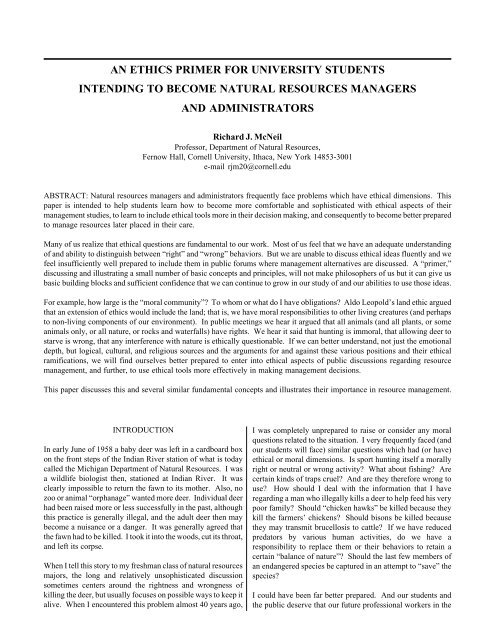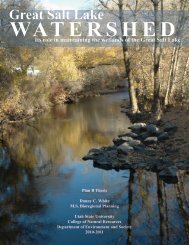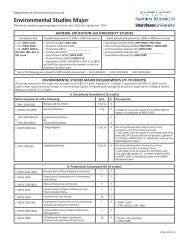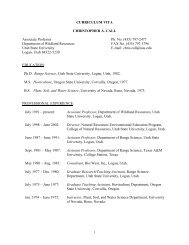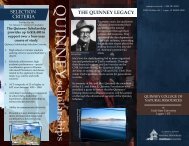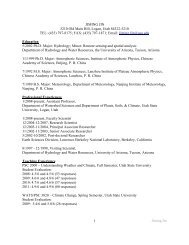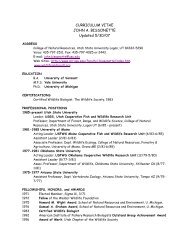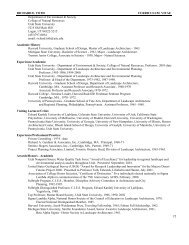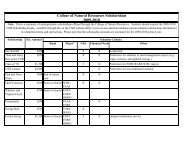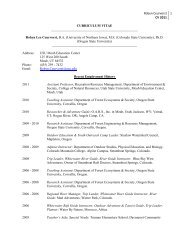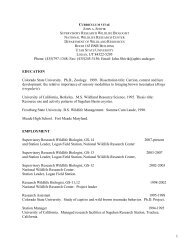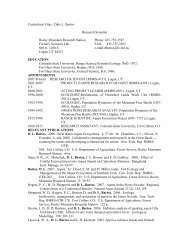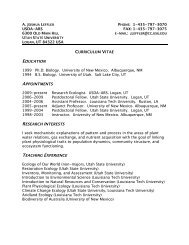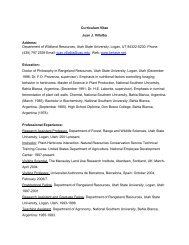University Education in Natural Resources - CNR Home - Utah State ...
University Education in Natural Resources - CNR Home - Utah State ...
University Education in Natural Resources - CNR Home - Utah State ...
Create successful ePaper yourself
Turn your PDF publications into a flip-book with our unique Google optimized e-Paper software.
AN ETHICS PRIMER FOR UNIVERSITY STUDENTS<br />
INTENDING TO BECOME NATURAL RESOURCES MANAGERS<br />
AND ADMINISTRATORS<br />
Richard J. McNeil<br />
Professor, Department of <strong>Natural</strong> <strong>Resources</strong>,<br />
Fernow Hall, Cornell <strong>University</strong>, Ithaca, New York 14853-3001<br />
e-mail rjm20@cornell.edu<br />
ABSTRACT: <strong>Natural</strong> resources managers and adm<strong>in</strong>istrators frequently face problems which have ethical dimensions. This<br />
paper is <strong>in</strong>tended to help students learn how to become more comfortable and sophisticated with ethical aspects of their<br />
management studies, to learn to <strong>in</strong>clude ethical tools more <strong>in</strong> their decision mak<strong>in</strong>g, and consequently to become better prepared<br />
to manage resources later placed <strong>in</strong> their care.<br />
Many of us realize that ethical questions are fundamental to our work. Most of us feel that we have an adequate understand<strong>in</strong>g<br />
of and ability to dist<strong>in</strong>guish between “right” and “wrong” behaviors. But we are unable to discuss ethical ideas fluently and we<br />
feel <strong>in</strong>sufficiently well prepared to <strong>in</strong>clude them <strong>in</strong> public forums where management alternatives are discussed. A “primer,”<br />
discuss<strong>in</strong>g and illustrat<strong>in</strong>g a small number of basic concepts and pr<strong>in</strong>ciples, will not make philosophers of us but it can give us<br />
basic build<strong>in</strong>g blocks and sufficient confidence that we can cont<strong>in</strong>ue to grow <strong>in</strong> our study of and our abilities to use those ideas.<br />
For example, how large is the “moral community”? To whom or what do I have obligations? Aldo Leopold’s land ethic argued<br />
that an extension of ethics would <strong>in</strong>clude the land; that is, we have moral responsibilities to other liv<strong>in</strong>g creatures (and perhaps<br />
to non-liv<strong>in</strong>g components of our environment). In public meet<strong>in</strong>gs we hear it argued that all animals (and all plants, or some<br />
animals only, or all nature, or rocks and waterfalls) have rights. We hear it said that hunt<strong>in</strong>g is immoral, that allow<strong>in</strong>g deer to<br />
starve is wrong, that any <strong>in</strong>terference with nature is ethically questionable. If we can better understand, not just the emotional<br />
depth, but logical, cultural, and religious sources and the arguments for and aga<strong>in</strong>st these various positions and their ethical<br />
ramifications, we will f<strong>in</strong>d ourselves better prepared to enter <strong>in</strong>to ethical aspects of public discussions regard<strong>in</strong>g resource<br />
management, and further, to use ethical tools more effectively <strong>in</strong> mak<strong>in</strong>g management decisions.<br />
This paper discusses this and several similar fundamental concepts and illustrates their importance <strong>in</strong> resource management.<br />
INTRODUCTION<br />
In early June of 1958 a baby deer was left <strong>in</strong> a cardboard box<br />
on the front steps of the Indian River station of what is today<br />
called the Michigan Department of <strong>Natural</strong> <strong>Resources</strong>. I was<br />
a wildlife biologist then, stationed at Indian River. It was<br />
clearly impossible to return the fawn to its mother. Also, no<br />
zoo or animal “orphanage” wanted more deer. Individual deer<br />
had been raised more or less successfully <strong>in</strong> the past, although<br />
this practice is generally illegal, and the adult deer then may<br />
become a nuisance or a danger. It was generally agreed that<br />
the fawn had to be killed. I took it <strong>in</strong>to the woods, cut its throat,<br />
and left its corpse.<br />
When I tell this story to my freshman class of natural resources<br />
majors, the long and relatively unsophisticated discussion<br />
sometimes centers around the rightness and wrongness of<br />
kill<strong>in</strong>g the deer, but usually focuses on possible ways to keep it<br />
alive. When I encountered this problem almost 40 years ago,<br />
I was completely unprepared to raise or consider any moral<br />
questions related to the situation. I very frequently faced (and<br />
our students will face) similar questions which had (or have)<br />
ethical or moral dimensions. Is sport hunt<strong>in</strong>g itself a morally<br />
right or neutral or wrong activity? What about fish<strong>in</strong>g? Are<br />
certa<strong>in</strong> k<strong>in</strong>ds of traps cruel? And are they therefore wrong to<br />
use? How should I deal with the <strong>in</strong>formation that I have<br />
regard<strong>in</strong>g a man who illegally kills a deer to help feed his very<br />
poor family? Should “chicken hawks” be killed because they<br />
kill the farmers’ chickens? Should bisons be killed because<br />
they may transmit brucellosis to cattle? If we have reduced<br />
predators by various human activities, do we have a<br />
responsibility to replace them or their behaviors to reta<strong>in</strong> a<br />
certa<strong>in</strong> “balance of nature”? Should the last few members of<br />
an endangered species be captured <strong>in</strong> an attempt to “save” the<br />
species?<br />
I could have been far better prepared. And our students and<br />
the public deserve that our future professional workers <strong>in</strong> the


